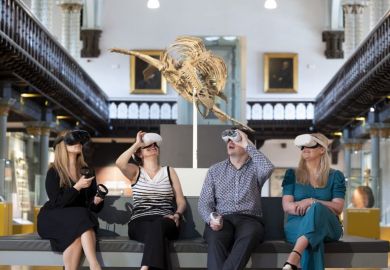The UK government’s industrial strategy framework, launched in November, acknowledges what many in the creative sector have repeatedly pointed out: creativity is a major driver of economic growth, contributing more than £100 billion to the economy each year.
The £60 million funding package that the government pledged to support the sector is a start and recognises its value at a policy level. However, for all this promising recognition, there remains a glaring disconnection from the on-the-ground reality. Over the past decade, creative education across the country has been scaled back from primary school level upwards, leaving a broken talent pipeline with fewer young people developing skills in these domains and choosing to study creative subjects.
Additionally, arts degrees have increasingly become unprofitable to run, with some institutions having to make really difficult choices. Last year, several high-profile institutions announced that they would be cutting significant numbers of their subjects because of a lack of profitability.
Unfortunately, these are not isolated cases. The impact of the previous government’s underfunding of the arts has reinforced a narrative that creative careers are poorly paid, unstable or somehow less valuable than more traditional routes.
The term “creativity” is too easily dismissed as the realm of artful fancy, conjuring up images of film-makers and drama studios. This both completely misrepresents the economic impact of the arts and forgets that the creative industries are not just about film, theatre and fine art. They encompass some of the fastest-growing and most prosperous sectors in the economy, from AI-driven design to virtual reality modelling and digital fashion.
If the UK wants to be a global leader in the creative economy, a position it has traditionally held, we need to rethink how we support our talent pipeline. That means bringing higher education on board as a crucial partner that can help shape the future of the sector, rather than just seeing it as a simple provider of skilled graduates.
This matters because the creative sector in the UK is expanding rapidly, but the skills pipeline is not. Industries such as film, gaming, advertising, and digital fashion are endlessly hunting for talent, yet employers struggle to find graduates with the right blend of creative and technical expertise. It’s not just the creative sector that benefits from creative education; organisations such as Meta, Apple, Netflix and Google have reshaped commerce, entertainment and communication over the past decade and creativity is a core skill that all these tech-enabled businesses demand.
At Ravensbourne, we have adapted to this market demand by creating courses at the intersection of creative, technology and business. Business students benefit from creative problem-solving, while creative students gain an entrepreneurial edge by understanding commercial realities. This kind of cross-disciplinary education is not a luxury in the modern world. It is essential if we want to equip graduates to meet the demands of an ever-changing economy.
Moreover, it is one of the most important ways in which universities can keep up and ensure that creative pathways are refreshed with industrial and technical knowledge. Our proactive adaptation can enable this through new types of flexible courses that widen the range of skills and experiences we offer to students.
But for this to happen at scale, we need sustained, long-term investment. Decades of underfunding in creative education have left universities fighting to keep these courses viable. While the government’s funding pledge is welcome, £60 million barely scratches the surface of what is needed to rebuild and future-proof the sector.
If the government wants its industrial strategy to succeed, it must treat universities as partners in shaping the creative economy. That means stronger collaboration and a continual open dialogue between education and industry to ensure graduates leave with the skills that businesses genuinely need.
This feedback loop is something we prioritise at Ravensbourne. Our new 2030 strategy is centred around a “Built for Industry” approach and aims to provide education at the intersection of business, creativity and technology. Our vision is that students do not just learn theory but gain direct experience working with businesses they may one day join or even start themselves. Employers need graduates who can contribute from day one, and universities need insights from industry to stay ahead of emerging trends.
We need to change the narrative around creative education, however.
Thankfully, we now have this chance to rewrite the story and alter the perception around creative careers. The government has set out its ambitions but delivering them requires genuine engagement with education providers. That means tackling the funding challenges that have put creative courses at risk, strengthening the skills pipeline through closer industry collaboration, and embedding universities into the wider industrial strategy.
It is worth a reminder, too, that the creative sector is not just an economic asset. It is a defining part of Britain’s identity and a crucial part of our global standing, in both hard and soft power. If we are to continue leading the way, we need an education system that empowers the next generation of creative professionals, and not one that leaves them behind.
Andy Cook is vice-chancellor of Ravensbourne University London.
Register to continue
Why register?
- Registration is free and only takes a moment
- Once registered, you can read 3 articles a month
- Sign up for our newsletter
Subscribe
Or subscribe for unlimited access to:
- Unlimited access to news, views, insights & reviews
- Digital editions
- Digital access to THE’s university and college rankings analysis
Already registered or a current subscriber?








